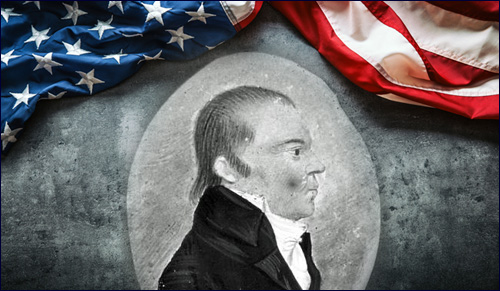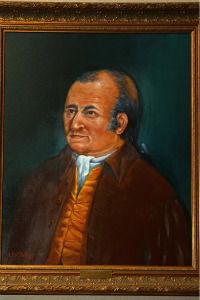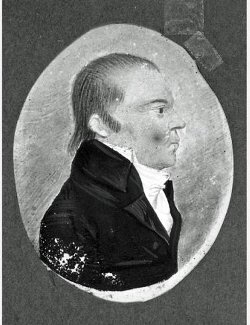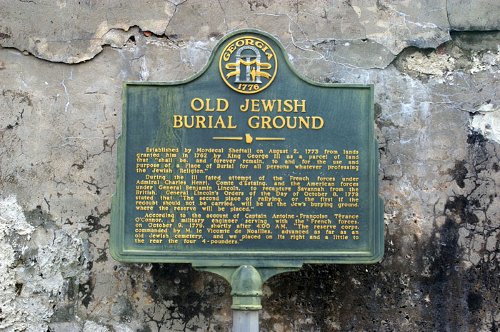 Iran’s Attack on Israel
Iran’s Attack on Israel


6 min read
Mordecai Sheftall is one of the greatest American patriots you’ve never heard of.
Mordecai Sheftall, an Orthodox Jew who lived in pre-revolutionary Georgia, was one of the first colonists to call for rebellion against British rule. He helped organize America’s revolutionary armies, at times paying for soldiers’ uniforms and rations out of his own pocket. He was captured by the British, who called him “a Very Great Rebel”, spent time on a brutal prison ship, and helped build Jewish communities in the new United States he’d helped found.
 Mordecai Sheftall
Mordecai Sheftall
Mordecai’s parents, Benjamin and Perla Sheftall, were some of the earliest settlers in Georgia. Benjamin sailed to the new colony in 1733 from London, along with 40 Jewish families, and settled in the Savannah area. When Mordecai was born in 1735 in Savannah, he was one of the very first native Georgians born in the new colony.
The family was poor and the few local schools could only educate Mordecai to the age of 11. Mordecai quickly became a successful businessman. By 17 he was tanning deerskins, and by 18 he’d saved enough money to buy grazing land in Vernonburg, near Savannah, and raise cattle. By 25, Mordecai owned a warehouse on the Savannah River and was a prominent local trader.
 At the time, Savannah’s Jewish community numbered only six families. Mordecai married a Jewish woman named Fannie from Charleston, South Carolina, and together the couple helped build up Savannah’s Jewish institutions. They were founding members of the town’s sole synagogue, Congregation Mickve Israel, at first holding services in a room in their house. Mordecai also donated land for Savannah’s first Jewish cemetery. He was a pioneering member, and the sole Jewish representative, in Savannah’s Union Society, a non-denominational religious group helping widows and children. He maintained his religious observance and ate only kosher food.
At the time, Savannah’s Jewish community numbered only six families. Mordecai married a Jewish woman named Fannie from Charleston, South Carolina, and together the couple helped build up Savannah’s Jewish institutions. They were founding members of the town’s sole synagogue, Congregation Mickve Israel, at first holding services in a room in their house. Mordecai also donated land for Savannah’s first Jewish cemetery. He was a pioneering member, and the sole Jewish representative, in Savannah’s Union Society, a non-denominational religious group helping widows and children. He maintained his religious observance and ate only kosher food.
Politically, Mordecai was an outspoken proponent of independence, a member of the pro-independence Union Society, and one of a clandestine group of men dubbed “Liberty Boys” who met in secret as early as 1774 to plan ways to protest British taxation and control of its colonies. In 1775, these audacious men disabled British cannons preventing them from being fired in public celebration of King George III’s birthday, and erected a “Liberty Pole” monument in Savannah to protest British rule. The group also stole gunpowder and bullets from British forces, secreting them away to use in case of war with Britain.
 Mordecai Sheftall
Mordecai Sheftall
In 1776, Mordecai’s fellow patriots elected him chairman of Savannah’s Revolutionary Committee. This group soon seized control of Savannah. The populist nature of the rebels horrified the British. The Royal Governor of Georgia complained that Savannah was now controlled by “a Parcel of the Lowest People, chiefly carpenters, shoemakers, blacksmiths, etc., with a Jew at their head.”
In 1777, with the Revolutionary War underway, the Continental Congress made Mordecai Commissary General of Purchases and Issues for rebel troops in Georgia, and in 1778 appointed him Deputy Commissary General for troops in Georgia and South Carolina. In other words, Mordecai was responsible for supplying Georgian soldiers with food, clothing, weapons and other materiel. It was a nearly impossible task; shortages plagued the American rebels during those years. George Washington famously estimated that a third of his troops had no shoes.
Mordecai used his own money to pay for equipment and food, then took out huge loans to buy even more.
Mordecai was determined that troops under his care fared better. When the Continental Congress failed to provide funds to outfit troops in Georgia and South Carolina, Mordecai used his own money to pay for equipment and food, then took out huge loans to buy even more, bankrupting himself in the process.
Mordecai saw action as well, and fought British forces. Both Mordecai and his 15-year-old son Sheftall fought in the First Battle of Savannah in December 1778. As British troops overpowered the outnumbered patriots, many American rebels escaped by swimming across the Savannah River to safety. Sheftall wasn’t able to swim, however, and Mordecai refused to abandon his son. Both were captured by British soldiers, along with 185 other rebels.
His British captors called Mordecai a “Very Great Rebel”, and also noted his Jewishness, singling him out for especially harsh treatment and questioning. Mordecai and his son were denied food for two days and were threatened with death by bayonet unless they divulged military secrets of the rebels. They refused to betray their fellow rebels and were imprisoned for months on the infamous British prison ship the Nancy, under harsh conditions. Knowing that he was an observant Jew, his British captors gave Mordecai no meat other than pork, which he refused to eat.
His British captors gave Mordecai no meat other than pork, which he refused to eat.
While he was held captive, Mordecai’s fellow rebels elected him the president of the pro-revolutionary Union Society of Savannah, in absentia. Eventually freed, Mordecai and his son were allowed to live near Savannah under virtual house arrest; the rest of the family fled to relative safety in Charleston.
When local colonists who sympathized with the British started hunting and killing rebel troops, Mordecai and Sheftall managed to gain berths on a ship heading to what they hoped was freedom in Charleston. Instead, disaster struck: they were captured at sea by a British frigate and sent to the British colony of Antigua in the Caribbean, where they found themselves imprisoned once again.
From Antigua, Mordecai petitioned the Continental Congress to negotiate for his release, and the family was eventually able to regroup in Philadelphia 1780. There, Mordecai continued to work for the Revolutionary cause, and also helped build a new synagogue for the city’s burgeoning Jewish population. Though he tried to build a shipping business, his ventures didn’t succeed, and family lived in poverty, their former great fortune spent on supporting the Revolution.

After the war, the Sheftalls finally returned to their beloved Savannah. Their extensive family businesses were gone, and British troops had long ago seized and dispersed the family’s property. Mordecai petitioned the new American Government to repay the many loans he’d made to the Revolutionary cause, to no avail.
Mordecai worked as a state employee, charged with procurement in new State of Georgia that he’s done so much to help usher to freedom. He also threw himself into Jewish communal work, serving as president of the synagogue he’d help found. Mordecai died on July 6, 1797, and was buried in the same Jewish cemetery in Savannah that he’d founded years before. The Sheftall Cemetery was named for his generosity, reflecting his determination to build a Jewish community in his beloved home town, in a free United States of America that this patriot had done so much to help create.

The author' research is impeccable, as always. I never knew of this patriot, although I did know of Chaim Solomon. It is not surprising that the American government refused its financial obligations to him, just as they did to Chaim Solomon. Thank you so much for sharing and educating.